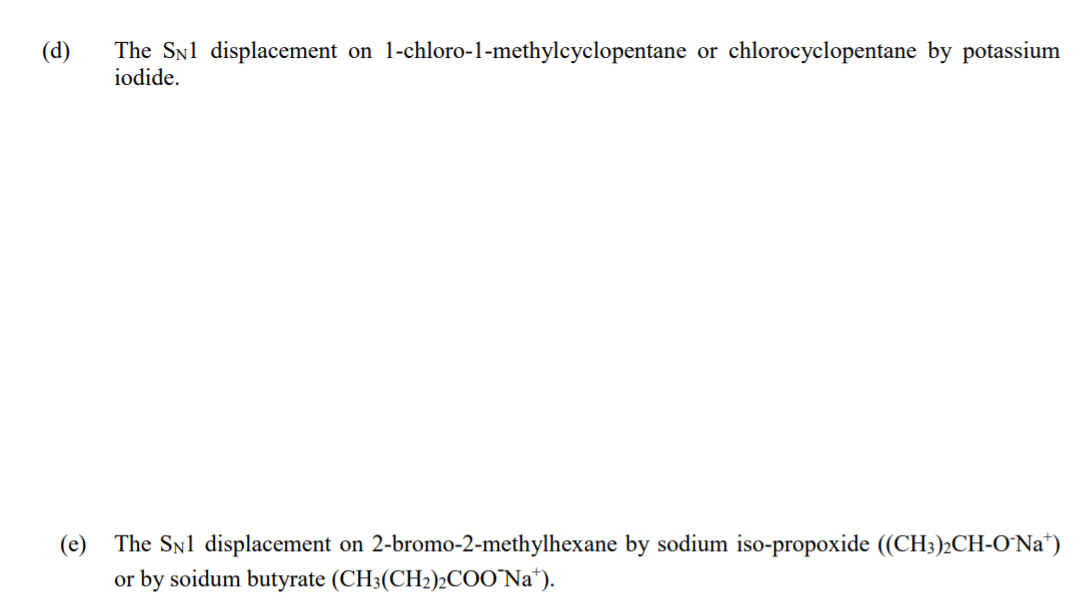Which reaction in each of the following pairs would you expect to be faster? (i) Write both reactions using bond-line presentation and, using arrows providing a mechanistic explanation of the course of the reaction, draw either a transition state or an intermediate product of the reaction; (ii) Shortly (one sentence) explain your reasoning why one of the two reactions will be faster.
Which reaction in each of the following pairs would you expect to be faster? (i) Write both reactions using bond-line presentation and, using arrows providing a mechanistic explanation of the course of the reaction, draw either a transition state or an intermediate product of the reaction; (ii) Shortly (one sentence) explain your reasoning why one of the two reactions will be faster.
Chemistry
10th Edition
ISBN:9781305957404
Author:Steven S. Zumdahl, Susan A. Zumdahl, Donald J. DeCoste
Publisher:Steven S. Zumdahl, Susan A. Zumdahl, Donald J. DeCoste
Chapter1: Chemical Foundations
Section: Chapter Questions
Problem 1RQ: Define and explain the differences between the following terms. a. law and theory b. theory and...
Related questions
Question

Transcribed Image Text:Which reaction in each of the following pairs would you expect to be faster?
(i)
Write both reactions using bond-line presentation and, using arrows providing a mechanistic
explanation of the course of the reaction, draw either a transition state or an intermediate
product of the reaction;
(ii) Shortly (one sentence) explain your reasoning why one of the two reactions will be faster.

Transcribed Image Text:The Snl displacement on 1-chloro-1-methylcyclopentane or chlorocyclopentane by potassium
iodide.
(d)
The Syl displacement on 2-bromo-2-methylhexane by sodium iso-propoxide ((CH3)2CH-0'Na*)
or by soidum butyrate (CH3(CH2)½CO0'Na*).
(e)
Expert Solution
This question has been solved!
Explore an expertly crafted, step-by-step solution for a thorough understanding of key concepts.
Step by step
Solved in 4 steps with 1 images

Recommended textbooks for you

Chemistry
Chemistry
ISBN:
9781305957404
Author:
Steven S. Zumdahl, Susan A. Zumdahl, Donald J. DeCoste
Publisher:
Cengage Learning

Chemistry
Chemistry
ISBN:
9781259911156
Author:
Raymond Chang Dr., Jason Overby Professor
Publisher:
McGraw-Hill Education

Principles of Instrumental Analysis
Chemistry
ISBN:
9781305577213
Author:
Douglas A. Skoog, F. James Holler, Stanley R. Crouch
Publisher:
Cengage Learning

Chemistry
Chemistry
ISBN:
9781305957404
Author:
Steven S. Zumdahl, Susan A. Zumdahl, Donald J. DeCoste
Publisher:
Cengage Learning

Chemistry
Chemistry
ISBN:
9781259911156
Author:
Raymond Chang Dr., Jason Overby Professor
Publisher:
McGraw-Hill Education

Principles of Instrumental Analysis
Chemistry
ISBN:
9781305577213
Author:
Douglas A. Skoog, F. James Holler, Stanley R. Crouch
Publisher:
Cengage Learning

Organic Chemistry
Chemistry
ISBN:
9780078021558
Author:
Janice Gorzynski Smith Dr.
Publisher:
McGraw-Hill Education

Chemistry: Principles and Reactions
Chemistry
ISBN:
9781305079373
Author:
William L. Masterton, Cecile N. Hurley
Publisher:
Cengage Learning

Elementary Principles of Chemical Processes, Bind…
Chemistry
ISBN:
9781118431221
Author:
Richard M. Felder, Ronald W. Rousseau, Lisa G. Bullard
Publisher:
WILEY